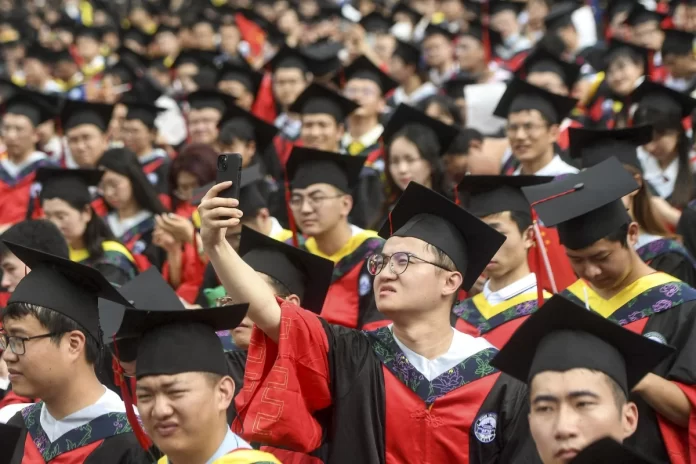A record 2.83 million applicants have applied for China’s national public servants exam, hoping to land positions still widely considered as the so-called iron rice bowl as uncertainty over jobs in the corporate sector has increased amid a slow post-pandemic economic recovery.
The written guokao exam, which will take place next month, will see candidates compete for a record high of more than 39,000 vacancies nationwide, according to official data – meaning on average one job opening per 72 applicants. According to Huatu Education Group, this year’s applications tops the nearly 2.5 million that signed up in 2022. Civil service positions are still increasingly sought after, particularly among fresh graduates, who are faced with fewer opportunities after a record 11.58 million university students graduated in China this year, rising living costs and mounting uncertainties, with the latest figure in June showing over 21 per cent of people aged 16-24 were unemployed.
“It’s interesting to see people are willing to take a very risky way to avoid future risk,” said Grace Zheng, a PhD candidate at Hong Kong University, who has been studying Chinese college students and education for many years. Some students, she added, will spend years preparing for the exam instead of seeking other employment, reflecting the “good student script” mindset adopted by many students in order to achieve high scores on tests, which is seen to be a path to top universities and jobs. “The top students, who are confident of always scoring higher in the tests, are the most qualified group to apply for the public servant jobs”, said Zheng. “Plus, the fact that the pandemic hit the private sector hard, it’s natural for them to turn to safer options within the government system.”
This year, a job with the National Bureau of Statistics survey team in the north-western Ningxia Hui autonomous region is set to be the most competitive position, with 3,500 applicants lined up for just one vacancy. Applicants are required to hold a master’s degree for the job that involves “engaging in statistical investigation, data processing, statistical analysis, statistical research, statistical news publicity, construction of laws and regulations and information construction”.
China has been expanding its recruitment of national-level civil servants for the last six years, creating more grass roots jobs for fresh graduates, amid calls to cut jobs within the central government. Newly added planned national-level civil servant positions reached around 19,000 this year, almost double the level seen in 2019, when on average 95 people competed for each job as reforms of central government agencies in 2018 increased competitiveness.
This year, 26,000 of the new jobs are designated for fresh college graduates, with more than two thirds to work at institutions directly affiliated with the central government at the county level and below. “It shows a trend to encourage talent to go to grass roots frontline positions, which can improve the quality of local public service personnel, thus upgrading public governance level,” Zhu Lijia, a professor with the National Academy of Governance, told the state-backed China News Service. This year, more positions require either a master’s degree and doctorate, while college studnets without a bachelor’s degree holders can only apply for 56 positions. More than 2,600 positions require a master’s degree, up from 1,700 last year, while 24 require a doctoral degree, up from 10 last year.
The reasons behind China’s high youth unemployment rate
The total number of vacancies increased by 7 per cent from last year, with jobs in local branches of agencies directly administered by the central government expanding by 5,000 alone. Jobs in central party’s organisations, national-level administrative agencies and other public institutions shrank by 33, 4 and 58 per cent, respectively. The change aligns with March’s reform plan for party and state institutions, which focused on building a “complete, scientific, standardised, and efficient” system. The plan aims to reduce central government staff by 5 per cent by the end of 2023, with local government goals to be decided by provincial parties, although it does not include downsizing requirements for county level and below.
Branches of the People’s Bank of China have been included in the exam for the first time, and its planned recruitment quota is the second largest after the taxation system. Reforms of the central bank were also mentioned in March’s guidelines, which abolished cross-regional and county-level branches amid efforts to make the banking system match with administrative divisions, so they can be better regulated by authorities.
Apart from the national level exam, provincial-level civil servant enrolment, which usually offers more job openings, will open in most authorities next year. In March, China’s 31 provincial-level jurisdictions planned to recruit more than 190,000 new staff in 2023, an increase of more than 16 per cent compared to a year earlier.
SCMP




















